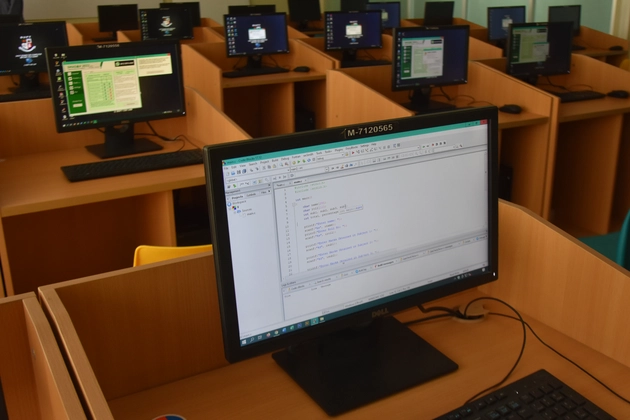
Laboratory Description - Department of CSE
The Department of Computer Science and Engineering (CSE) is dedicated to providing students with a comprehensive and practical education in the field of computer science and engineering. As part of this commitment, the department offers a range of well-equipped and cutting-edge laboratories for students to gain hands-on experience in various areas of study. These include the Programming Lab, Software Engineering Lab, Digital Logic Design Lab, Electrical Machine Lab, Electrical Circuit Lab, and Electrical Device Lab. The department is also working on developing new labs to keep pace with the latest trends in the industry. The Operating System Lab will provide an environment for students to learn about operating system design, development, and optimization. The Microprocessor and Assembly Language Lab will teach students about microprocessor architecture, assembly language programming, and interfacing. The High-Performance Computing Lab will provide students with an environment to explore the latest developments in high-performance computing systems and applications. The 4IR Lab will provide students with an opportunity to learn about the technologies and applications of the Fourth Industrial Revolution (4IR) such as artificial intelligence, robotics, and the Internet of Things (IoT). Overall, the CSE department's laboratories enable students to develop the skills and knowledge required for a successful career in the field of computer science and engineering.
Electrical Machine Lab (EM Lab)
Room No: 203
The EM Lab is set up to support students to learn the behavior of various electrical DC and AC machines such as motors, generators, transformers etc. through well designed experiments and closely monitored practice. This lab is used by the students of IE, CSE and TE departments. It has contemporary machine modules that replicate practical scenario regarding use of the electrical machines.
This lab provides students with carefully designed experiments. Students acquire familiarity about the working principle and output characteristics of generators and motors over and above what to expect while working with this form of mechanisms when applied. This building of confidence within students assist them in actively suggesting or participating in investigation of and solution development.
Currently the lab facility has two separate sets of machine modules that includes DC/AC Motor/Generator, Single/Three Phase Transformer, Three Phase Induction Motor, Resistive/Capacitive/Inductive loads along with other supporting equipment such as DC/AC Variable/Fixed Power Supply, Synchronizing Module, Electrodynamometer, Digital Power Factor Meter, Three phase Rheostat, Digital Wattmeter, DC/AC Voltmeter/Ammeter, Tachometer, Connecting Wires etc. The capacious lab comes along all necessary facility of a modern classroom i.e. Desktop, Projector, Webcam, Microphone, appropriate and at ease seating arrangement for students etc.
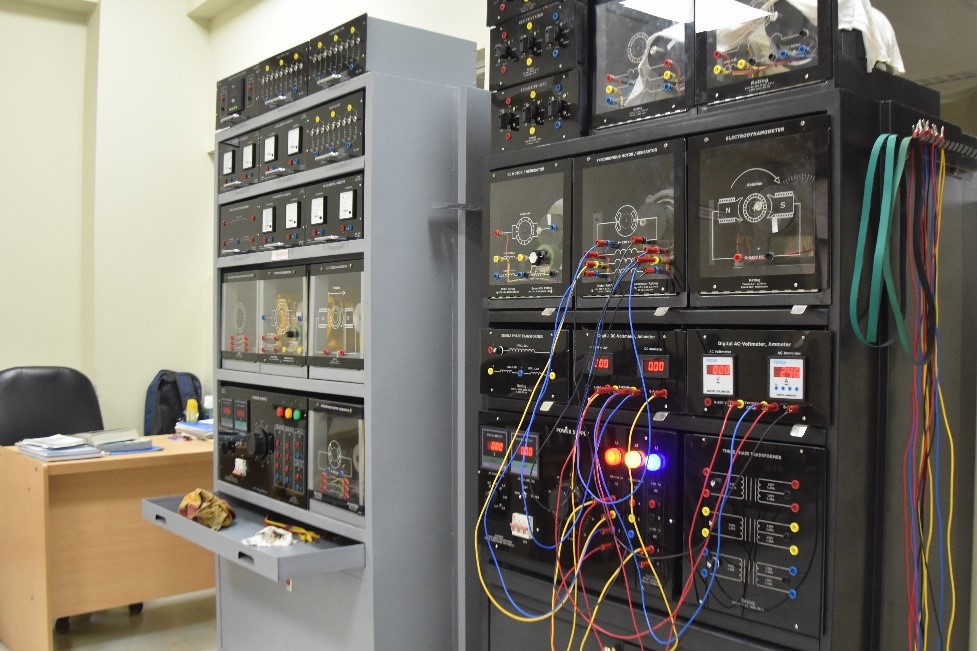
Electrical Circuit Lab (EC Lab)
Room No: 206
The EC Lab is dedicated for ensuring practice and experimentation facilities for students regarding courses on basics of electrical circuit. The laboratory is used by students of IE, CSE, TE and TEM departments. The lab has the capability, though of certain scale, to support project and research works.
The experimentations that are carried out in this lab provides students with knowledge of basic components and analysis method of DC and AC electrical circuits. The lab deploys modern equipment of various models and unlimited supply of other necessary electrical components to aid students in developing solid practical facts. Students acquire technical knowledge and develop problem analysis capability through practice and implementation of theoretical learnings.
The lab facility includes: Trainer board (A-TEK, AT-8011; SB-TEK, SB-700), Digital logic trainer board (SB-TEK, SB-600), DC power supply (SB-TEK, SB-3010), Function generator (TWINTEX, TFG-3610E, 10MHz) and plentiful Resistors, Capacitors, Inductors, Diodes, ICs, Sensors, Connecting wires along with assembly tools to operate effortlessly and efficiently. The spacious spectacular lab comes along all necessary facility of a modern classroom i.e. Desktop, Projector, Webcam, Microphone, appropriate and at ease seating arrangement for students etc.
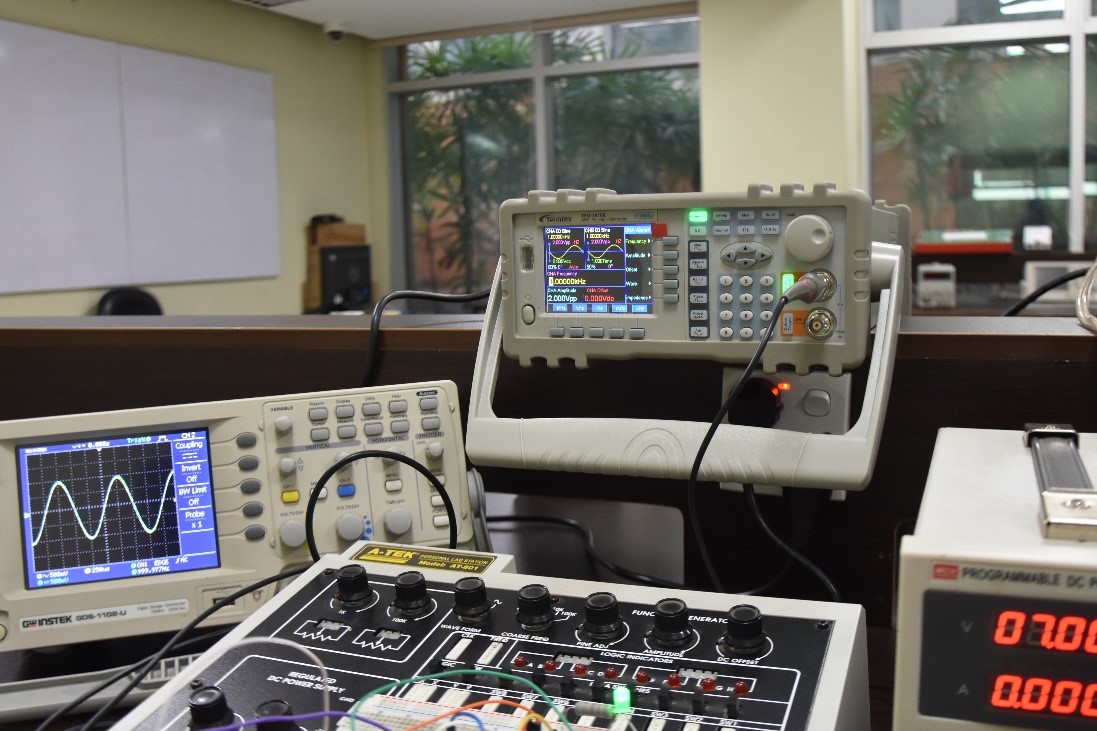
Electrical Device Lab (ED Lab)
Room No: 720
The ED Lab is dedicated for students to acquire understanding about electronic components and their characteristics that are considered while fabricating ICs as well as specialized circuits. This lab is used by the students of IE, CSE and TE departments. This lab also has the facility to operate courses related to electrical circuits and often used along the dedicated lab.
In this lab students learn about basic electrical components such as Diodes, BJTs, MOSFETs, OP-AMPs and their different operational modes. They learn about distinctive applications of clippers, clampers, amplifiers, filters, oscillators. These focusses introduces them with the far-reaching prospect of electronic and microelectronic realm and aids them with the capacity to do innovative and exceptional project works.
The lab incorporates: Trainer board (A-TEK, AT-8011; SB-TEK, SB-700), digital logic trainer board (SB-TEK, SB-600), DC power supply (SB-TEK, SB-3010), function generator (TWINTEX, TFG-3610E, 10MHz) and plentiful resistors, capacitors, inductors, diodes, ICs, sensors, connecting wires along with assembly tools to operate effortlessly and efficiently. The spacious spectacular lab comes along all necessary facility of a modern classroom i.e. desktop, projector, webcam, microphone, appropriate and at ease seating arrangement for students etc.
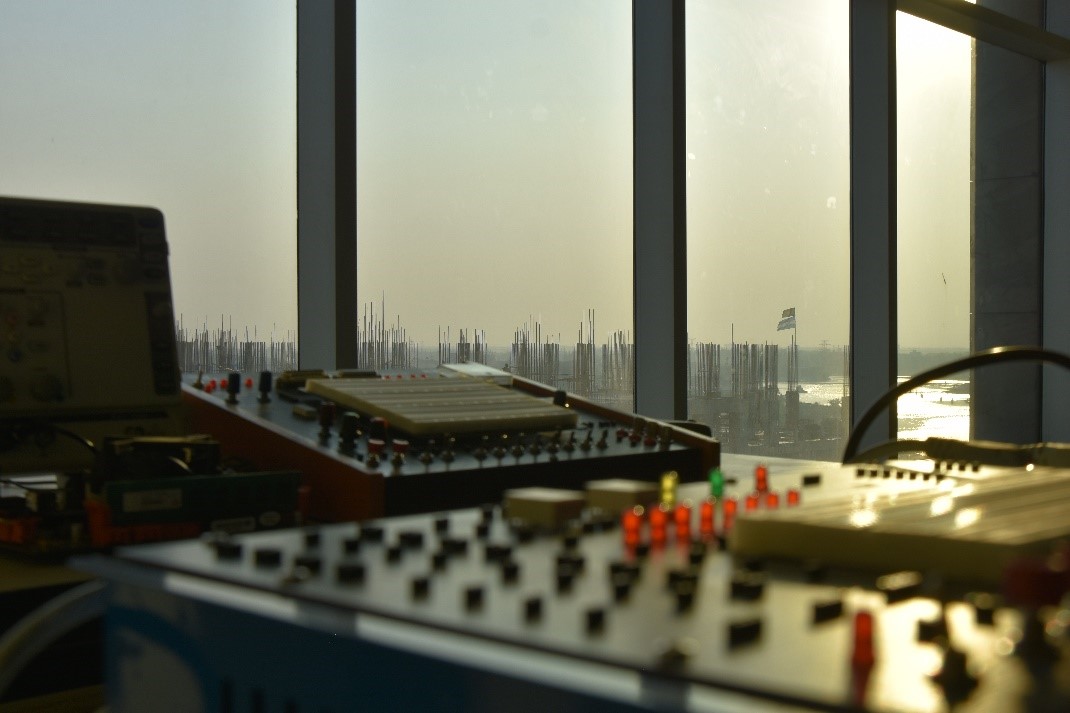
Digital Logic Design Lab (DLD Lab)
Room No: 724
The DLD Lab supports students to learn about different types of digital circuits and their operational features through well organized and prudently planned experiments. This lab is used by the students of IE and CSE departments. Along with the compulsory and full-fledged arrangements needed by the primary users, this lab has the competency for carrying out project and small scale research work related with electronic circuitry and robotics. The lab comes with the facility of modern design and analysis kit digital logic circuit. From fundamentals of digital circuit to advance theorems-students acquire familiarity about various types of combinational and sequential logic circuits along with their application arena. Alike electrical device lab, the carefully designed experimentations of this lab leads students with the comprehensive outlook of electronic and microelectronic world. Students grows up to be resourceful technologist who have the compact necessary knowledge, knows how to use modern tools and can take part in recommending answers to present-day glitches.
The lab set up encompasses: Advanced digital logic kit (KL-310; KL 32001, KL 34001, KL 320012, KL 32003, KL 32004, KL 32006, KL 39001 etc.) digital-analog training system (K&H, ETS-300; NGT-601, ETS-33051, ETS-33052), logic analyzer (SALEAE Logic Pro 8), digital storage oscilloscope (GW Instek, GDS 1102B), highly functional laptop and ample essential electrical components. The innovative lab comes along all necessary facility of a modern classroom i.e. desktop, projector, webcam, microphone, appropriate and at ease seating arrangement for students etc.
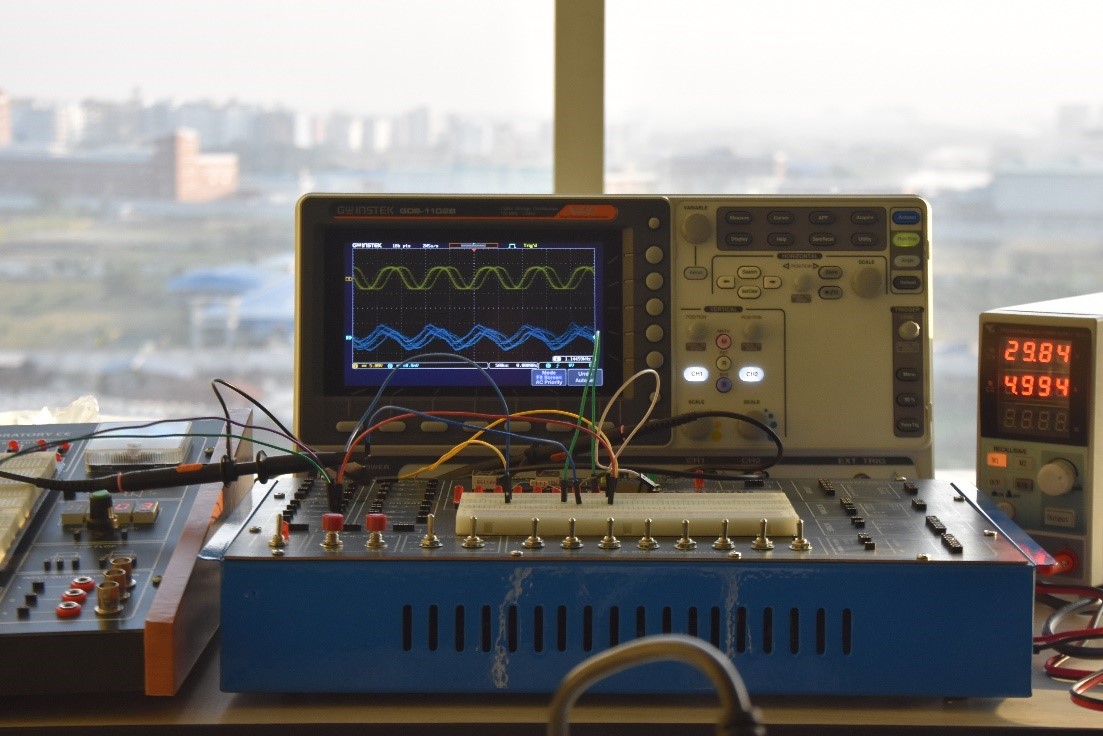
Software Engineering Lab (SW Lab)
Room No: 908
The SW Lab is well-founded with high configuration desktops and associated equipment to benefit students with the opportunity to learn about basic and advanced software design firsthand. The lab is mainly managed by the department of CSE. Few other departments also use this lab for their courses; operated by CSE department or by their own. The enormous classroom comes along all other necessary facility of modern-day classrooms. The SW Lab desktops are equipped with pre-installed software for software engineering including Integrated Development Environments (IDEs), source control/ version control software (git), and testing frameworks. Students will be able to apply software engineering principles and methodologies to design, develop, test, and manage software projects. They will also be able to collaborate with other developers using source control software and manage software projects using project management tools and techniques. Finally, students will be able to document software using different types of documentation, which is critical for maintaining software and communicating its functionality to stakeholders.
The lab computers encompasses: Processor: Intel Core i5,7th Gen, 3.40GHz; Ram: 12GB, DDR4 (2400MHz); Storage: SSD 128GB, Laxer with WD-1TB HDD OS: Windows 10 Pro - 64 bit; CPU/Monitor/Keyboard & Mouse HP) has numerous commonly used popular, advance, highly featured software installed including: MS Office Pro 2021, CodeBlocks, Notepad++/Sublime Text/Brackets, Emu8086, Netbeans, Eclipse, PyCharm Community Edition, Visual Basic, Visual Studio 2010 Professional, Xampp, Cisco Packet Tracer, VirtualBox (Inside-Linux Mint Cinnamon), FileZilla Pro, Android Studio 2021, Minitab v20, IBM SPSS Statistics 20, EndNote 2022, Matlab 2015, AutoCad 2015, SketchUp Pro 2020, SolidWorks 2018, Arena Simulation 16.0, Proteus Professional v8.13 SP0, Adobe Photoshop CS6, Adobe Photoshop CC, Adobe Illustrator CS6, Adobe Illustrator CC, CorelDRAW Graphics Suite 2018.
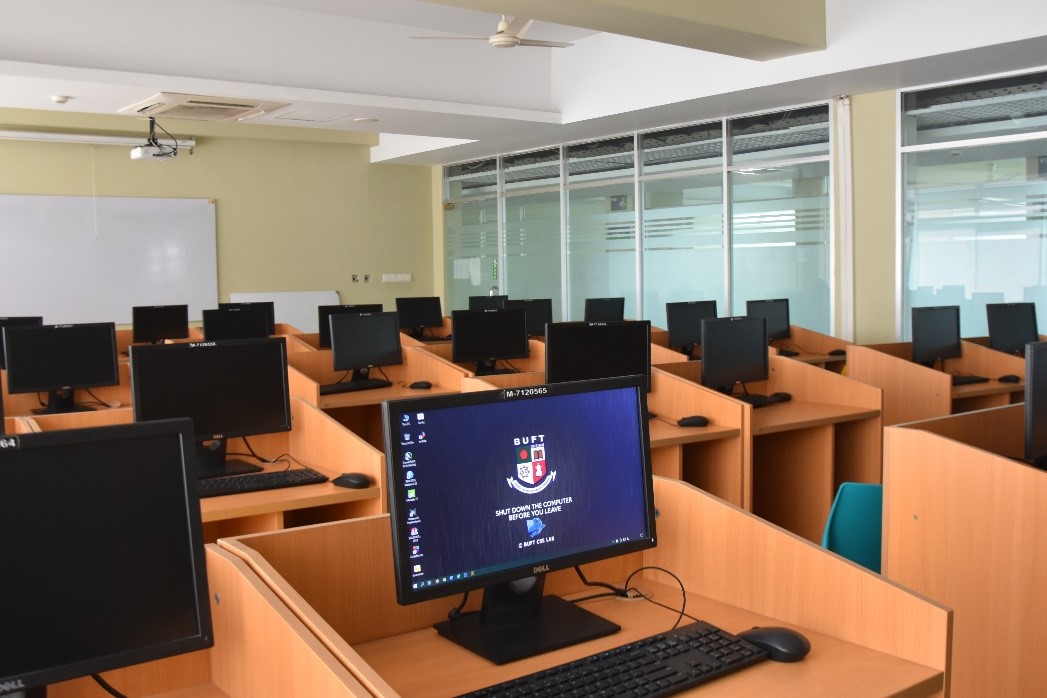
Programing Lab/ Programing Language Lab (PL Lab)
Room No: 910
The PL Lab holds the parallel distinction of software lab except that the high configuration desktops are exclusively dedicated and configured for practicing extensive programming. This lab is also managed by the department of CSE whereas few other departments use this lab for their certain courses. This lab facilitates the opportunity for projects and research works done by faculty members and students. The PL lab provides students with practical experience in programming concepts and techniques. Students will learn how to write, debug and execute programs using various programming languages, as well as how to apply programming concepts to solve real-world problems. By utilizing this lab, Students will be able to write, debug, and execute programs using different programming languages, as well as implement OOP concepts and data structures. They will also be able to read and write data from/to files, program web applications using web technologies, and program database applications using SQL/no-SQL and DBMS. Finally, students will be able to work collaboratively in a team, which is critical for developing complex programs.
The lab computers encompasses: Processor: Intel Core i5,7th Gen, 3.40GHz; Ram: 12GB, DDR4 (2400MHz); Storage: SSD 128GB, Laxer with WD-1TB HDD OS: Windows 10, Pro 64 bit; CPU/Monitor/Keyboard & Mouse HP) has installations including: MS Office Pro 2021, CodeBlocks, Notepad++/Sublime Tex/Brackets, emu8086, Netbeans, Eclipse, PyCharm Community Edition, Visual Basic, Visual Studio 2010 Professional, Xampp, Cisco Packet Tracer, VirtualBox (Inside-Linux Mint Cinnamon), FileZilla Pro, Android Studio 2021, Minitab v20, IBM SPSS Statistics 20, EndNote 2022, Matlab 2015, AutoCad 2015, SketchUp Pro 2020, SolidWorks 2018, Arena Simulation 16.0, Proteus Professional v8.13 SP0, Adobe Photoshop CS6, Adobe Photoshop CC, Adobe Illustrator CS6, Adobe Illustrator CC, CorelDRAW Graphics Suite 2018 etc.
